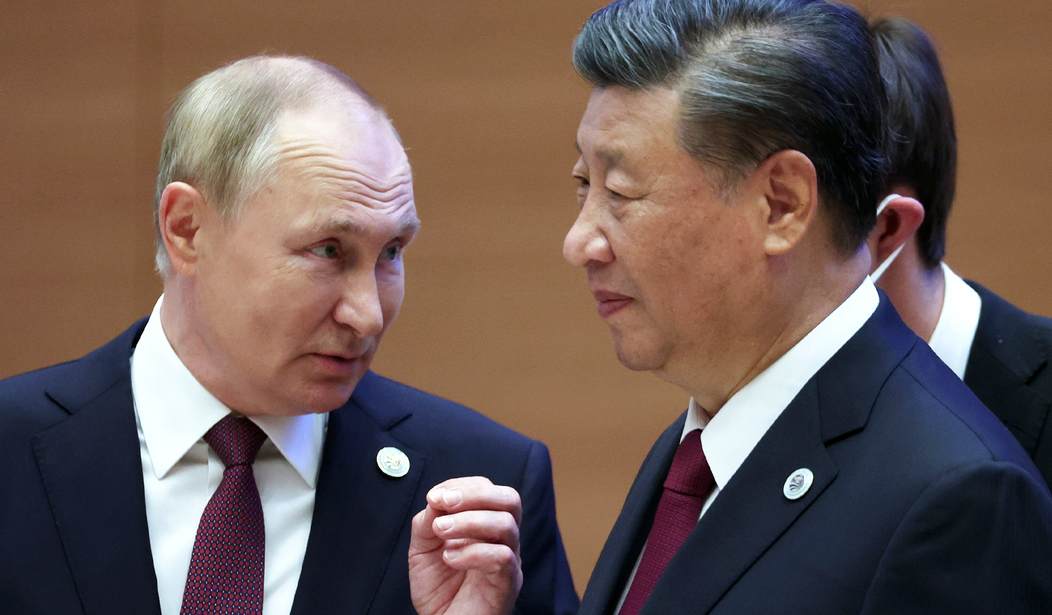We are coming up on the second year of “massive” sanctions against Russia, imposed as part of an economic warfare strategy in response to Putin’s invasion of Ukraine. So how has that been working out thus far? The sanctions haven’t been totally without effect to be sure. You can’t undergo that massive of a change to the normal operation of your economy without it having some sort of repercussions. But by all accounts, the impacts are mostly showing up in changes to Russian domestic and foreign policy at the governmental level. Day-to-day life for the residents of Moscow and other Russian communities required a few transitional adjustments, but things are mostly normal except for the occasional arrival of a Ukrainian drone slamming into a parking garage. The Associated Press tries to paint a rosier picture of the efficacy of the sanctions, describing them as “working like a slow poison.” But slow appears to be an understatement for Russians outside of the Kremlin.
The Russian ruble’s wobble in value has exposed a crack in President Vladimir Putin’s fortress economy, a vulnerability quickly plastered over by the Kremlin’s economic team in a move that allowed the currency to regain its footing, at least for now.
Yet the patch — an emergency interest rate increase — cannot hide the dilemma at the heart of the Russian economy: how to fund the military while not undermining the national currency and overheating the economy with corrosive and politically embarrassing inflation.
Life in Moscow presents a facade of normality despite sweeping sanctions tied to the war in Ukraine and the departure of hundreds of name-brand Western companies.
The trend continues throughout the rest of the article, but just from the excerpt above you can see the unspoken admission by the AP that Russia has largely managed to shrug off most impacts of the sanctions. They tried to make a big deal out of a brief dip in the value of the ruble, but it rebounded quickly and Russia’s currency remained stable. Meanwhile, the United States is seeing its own credit rating be downgraded. The adjustments made by the Kremlin allowed them to avoid what the AP tellingly described as “corrosive and politically embarrassing inflation.” Oh, really? Have you noticed the corrosive and politically embarrassing inflation Americans have been dealing with since Biden came to office?
The AP is correct to point out that a lot of Western business franchises abandoned Russia when the sanctions hit, including places like major clothing brands Zara and H&M, Krispy Kreme, and McDonald’s. But Russian entrepreneurs quickly moved in and established copycat replacement operations, frequently in the same buildings. So customers are still getting the goods and services they were used to for the most part. The only difference is that the money is staying in Russia rather than part of it being siphoned off to America and Europe. Remind me again how this is supposed to be hurting them and helping us?
As even the Associated Press admits, unemployment in Moscow is quite low. So is inflation, running at four percent in July, which is fairly typical when compared to previous years. They found a few people willing to complain about a lack of some goods or services, but not many. They identified a number of areas where previously imported goods that became less available are now being produced in Russia. This is insulating them from exposure and growing their domestic economy. Of course, when you suggest that we need to be doing a lot more of our own manufacturing in the United States, they label you as xenophobic or “anti-China.” (Please feel free to call me anti-China. I promise that I’ll try not to cry.)
The bottom line here is that after almost two years, the sanctions don’t really seem to be doing much of anything to the daily lives of most Russians. And if they don’t feel the pressure, they’re never going to exert upward pressure on Putin to end the war. Wasn’t that one of the driving claims about the sanctions in the first place? And meanwhile, Americans are the ones experiencing most of the downsides that were predicted for the Russians. Similar effects are being felt among some of our European allies. In fact, Germany is the one developed nation with an economy that actually retracted this year. Russia’s economy actually grew, though only modestly. Perhaps it’s time for a fresh look at this whole economic warfare theory. Not only does it not seem to be anywhere near as effective as was advertised, but it may actually be backfiring.









Join the conversation as a VIP Member